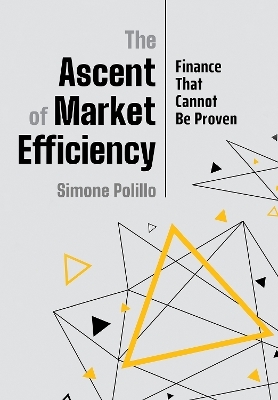
The Ascent of Market Efficiency
Finance That Cannot Be Proven
Seiten
2020
Cornell University Press (Verlag)
978-1-5017-5037-3 (ISBN)
Cornell University Press (Verlag)
978-1-5017-5037-3 (ISBN)
The Ascent of Market Efficiency weaves together historical narrative and quantitative bibliometric data to detail the path financial economists took in order to form one of the central theories of financial economics—the influential efficient-market hypothesis—which states that the behavior of financial markets is unpredictable.
As the notorious quip goes, a blindfolded monkey would do better than a group of experts in selecting a portfolio of securities, simply by throwing darts at the financial pages of a newspaper. How did such a hypothesis come to be so influential in the field of financial economics? How did financial economists turn a lack of evidence about systematic patterns in the behavior of financial markets into a foundational approach to the study of finance?
Each chapter in Simone Polillo's fascinating meld of economics, science, and sociology focuses on these questions, as well as on collaborative academic networks, and on the values and affects that kept the networks together as they struggled to define what the new field of financial economics should be about. In doing so, he introduces a new dimension—data analysis—to our understanding of the ways knowledge advances.
There are patterns in the ways knowledge is produced, and The Ascent of Market Efficiency helps us make sense of these patterns by providing a general framework that can be applied equally to other social and human sciences.
As the notorious quip goes, a blindfolded monkey would do better than a group of experts in selecting a portfolio of securities, simply by throwing darts at the financial pages of a newspaper. How did such a hypothesis come to be so influential in the field of financial economics? How did financial economists turn a lack of evidence about systematic patterns in the behavior of financial markets into a foundational approach to the study of finance?
Each chapter in Simone Polillo's fascinating meld of economics, science, and sociology focuses on these questions, as well as on collaborative academic networks, and on the values and affects that kept the networks together as they struggled to define what the new field of financial economics should be about. In doing so, he introduces a new dimension—data analysis—to our understanding of the ways knowledge advances.
There are patterns in the ways knowledge is produced, and The Ascent of Market Efficiency helps us make sense of these patterns by providing a general framework that can be applied equally to other social and human sciences.
Simone Polillo is Associate Professor in the Department of Sociology at University of Virginia. He is author of Conservatives vs. Wildcats. Follow him on X @simpol78.
1. Introduction: The Data- Method- Theory Triad, Or Why Finance Cannot Be Proven
2. The Rhe toric of Market Efficiency: How Data Analysis Became Legitimate
4. Winners and Losers in Financial Economics, or Fama versus Black: How Markets Became Efficient and Equilibrium Was Defeated
5. How Financial Economics Got Its Science
6. Conclusion: A Network Sociology of Scholarly Affects
| Erscheinungsdatum | 17.07.2020 |
|---|---|
| Zusatzinfo | 11 Charts; 7 Line drawings, black and white |
| Verlagsort | Ithaca |
| Sprache | englisch |
| Maße | 152 x 229 mm |
| Gewicht | 907 g |
| Themenwelt | Informatik ► Datenbanken ► Data Warehouse / Data Mining |
| Sozialwissenschaften ► Soziologie | |
| Wirtschaft ► Allgemeines / Lexika | |
| Wirtschaft ► Betriebswirtschaft / Management ► Finanzierung | |
| Wirtschaft ► Volkswirtschaftslehre | |
| ISBN-10 | 1-5017-5037-2 / 1501750372 |
| ISBN-13 | 978-1-5017-5037-3 / 9781501750373 |
| Zustand | Neuware |
| Informationen gemäß Produktsicherheitsverordnung (GPSR) | |
| Haben Sie eine Frage zum Produkt? |
Mehr entdecken
aus dem Bereich
aus dem Bereich
Auswertung von Daten mit pandas, NumPy und IPython
Buch | Softcover (2023)
O'Reilly (Verlag)
CHF 62,85
Datenanalyse für Künstliche Intelligenz
Buch | Softcover (2024)
De Gruyter Oldenbourg (Verlag)
CHF 104,90


